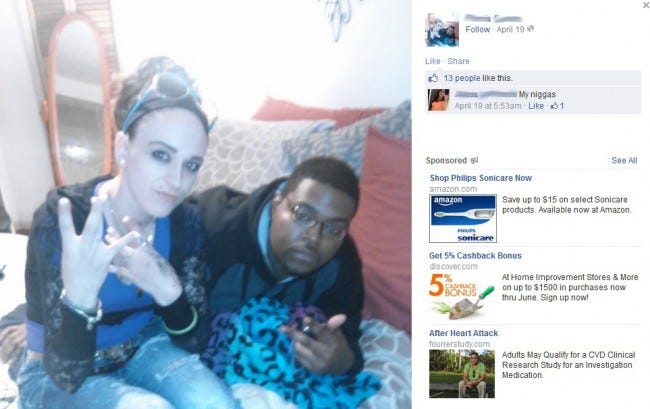I Can't Tell If This Means We Live In A Post-Racial America Or Not

So. Two days before Christmas I bailed a friend of mine out of jail. Unfortunately, he didn't stay out for long and unless I'm misreading the details of his case online my thousand dollars is now gone with the proverbial wind. While trying to track down his belle du jour on Facebook to inquire about the possibility of getting my money back, I saw this photo and the associated comment. (NB: The guy in the photo is not my friend, although they share a "race".)
The "banner photo" of this girl's Facebook is the Ohio Prison Information snapshot on her father, who has been incarcerated since 1998 and has a chance for release in 2015. I cannot imagine she's any older than about twenty, so basically her dad's been the joint as long as she can remember. As far as I can tell, she and her friends (including the girl who commented on the picture) live in fairly poverty-ridden circumstances. Their Facebook pages are, in a sense, the sewers of the Internet, consisting mostly of unanswered pleas for attention, fifth-hand cliches, image macros containing misleading or incorrect information, and Worldstarhiphop videos of street fights.
I've long been fascinated by the way the poor and undereducated use Facebook and other Internet services. When I first joined USENET in 1989, I was under the idealistic and completely mistaken impression that it would eventually elevate us all through access to information and communication that had previously been unavailable at any price. I thought that poor people would use the Internet the way KRS-One used the public library: as a ladder to middle-class living and an educated perspective.
Of course, I was wrong. The Internet didn't bring the lower classes out of the ghetto; the lower classes brought the ghetto to the Internet. "They" don't use it like "we" do. Which is fine, but it's also depressing. We've managed to provide eighty-three percent of this country (more if you count the smartphone users with no home access) with a portal to the greatest knowledge resource in human history, but it turns out that a large part of that eigthty-three percent just wants to see pornography and surveillance-camera video of street fights.
Anyway, back to my title for this post. What we have here are two young white women and a young black guy, all of whom have appropriated "black" signs, signifiers, and language. Does this mean that we live in a post-racial America, or, at the very least, that the poor live in a post-racial America? I would suggest that what's really going on here is that we're seeing the dissociation of cultural signifers with race and the re-association of those signifiers with class. It may be that, fifty years from now, poor people of all races will "act black" and middle-class people of all races will "act white", the same way the children of previous generations of European immigrants gave up many of their cultural traditions in order to fit into the American middle class.
This has been going on for a long time --- I remember sitting in a friend's Section 8 apartment on the West Side of Columbus twenty-six years ago and hearing a bunch of white guys aping the dialect and diction of MC Ren --- but the Internet has gone a long way towards accelerating the process. Facebook is a walled garden for the lower-income people who wind up in an echo chamber of their own culture. It reinforces their behavior, it provides them with (almost entirely negative) examples on which to model themselves, and it normalizes self-destructive actions by replacing the bland, vaguely moral messages that used to come from television with documented evidence of their peer group's lifestyle.
In short, access to enhanced information technology hasn't freed the poor in America. It's shackled them further. Can that be fixed? Not without drastically changing how all of us consume information. In the meantime, you're free to laugh at the specter of a lily-white girl using the "n-word" to describe her friends, but she knows what she's doing. She's redefining the term to refer to a class of people who will be stamped with the mark of their class-based education and acculturation nearly as indelibly as the original targets of that word were pigmented. Post-racial? Maybe. But it's not the United Colors of Benetton; more like the united viewpoint of the lost.

